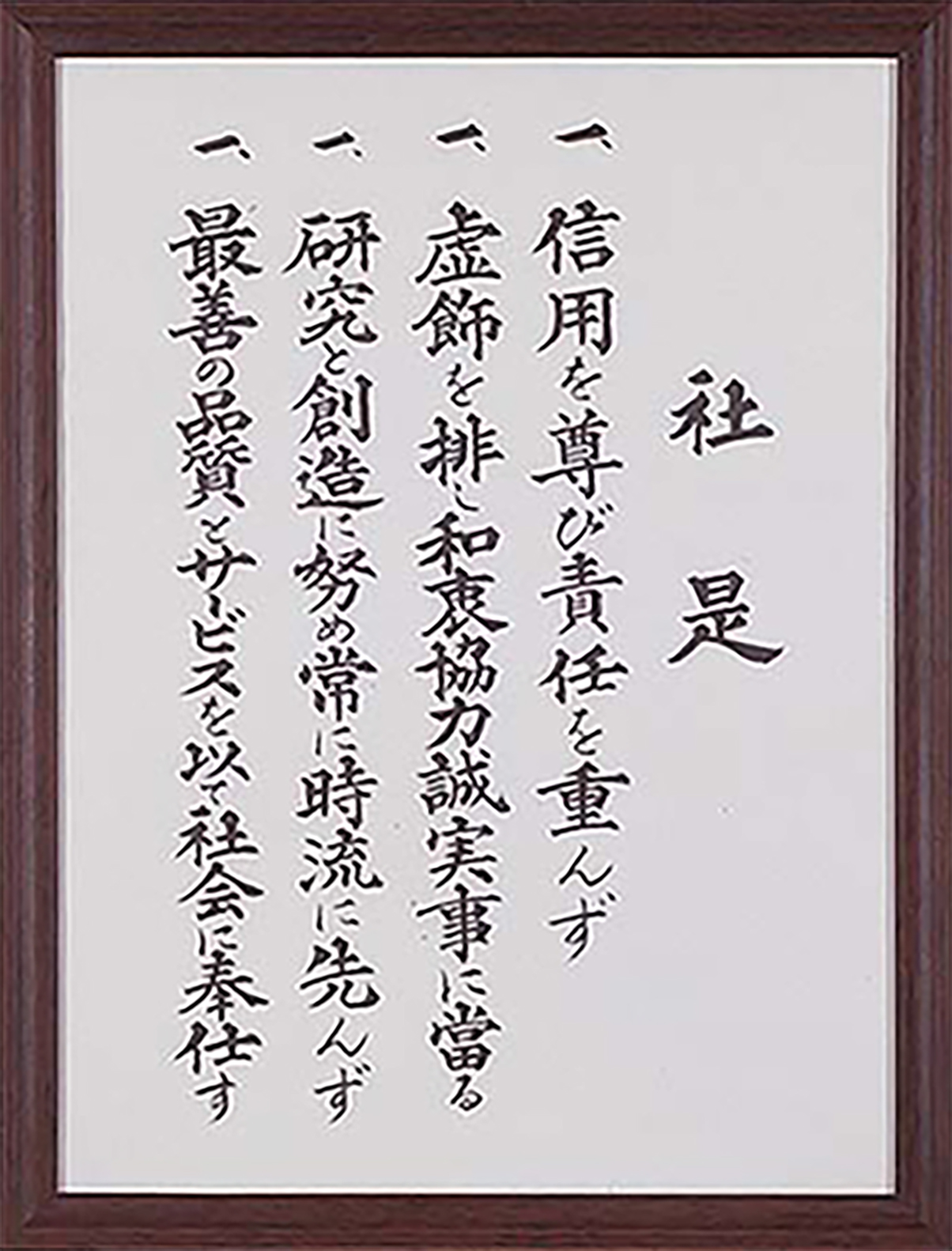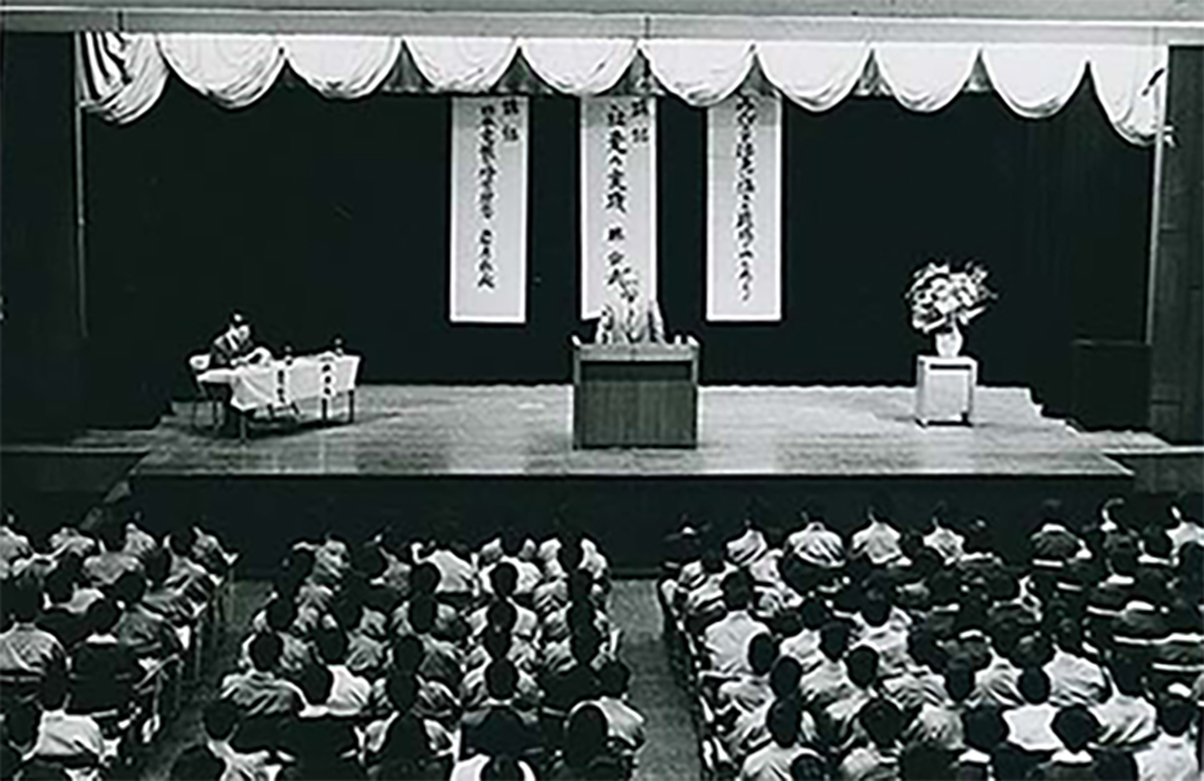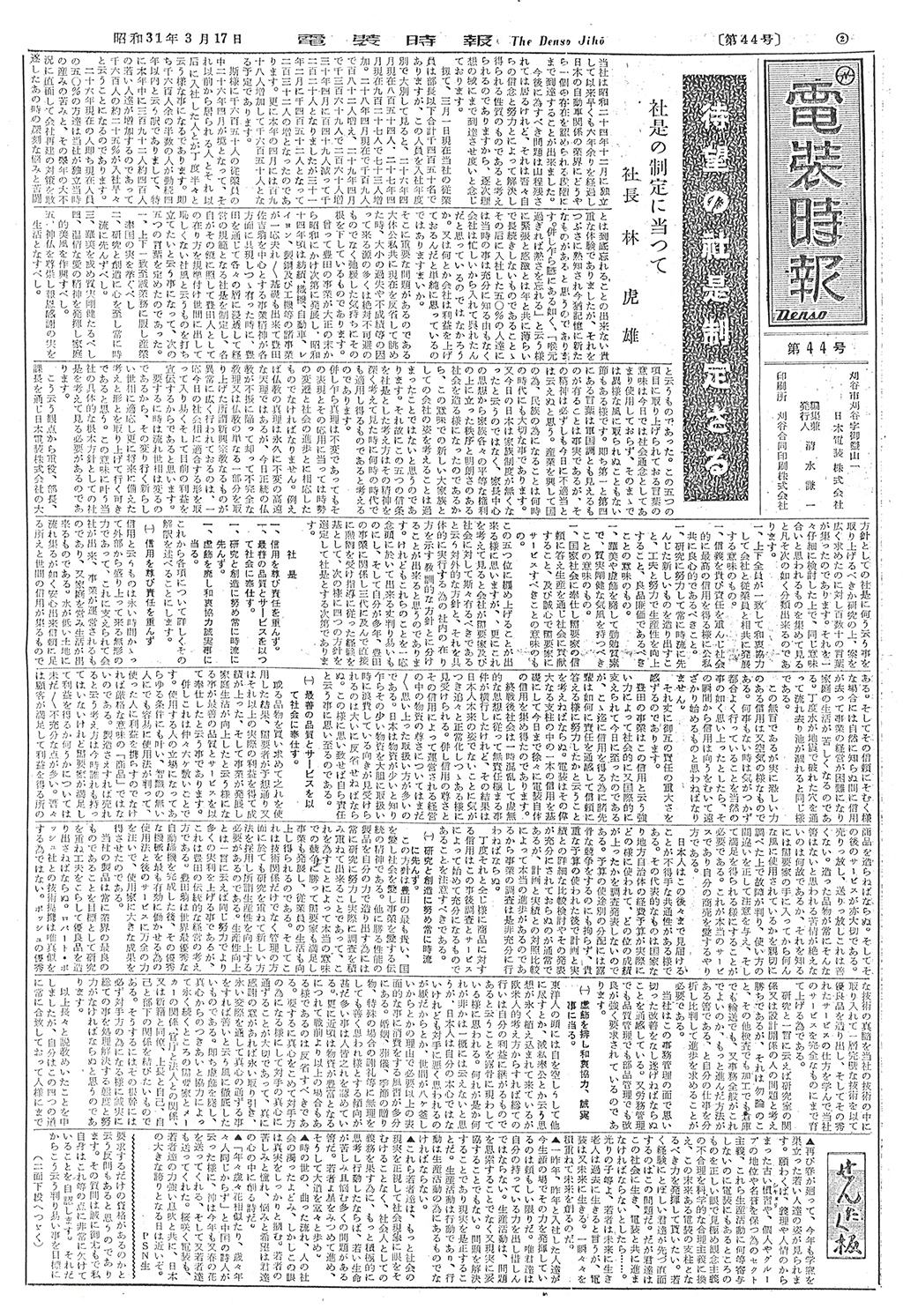5. Establishment of the Company Creed
1949-
(1) The Spirit of Founding
- 1956
- The progress of our company's crucial First Five-Year Plan had stagnated. A turnaround was imperative. To rally all efforts, President Torao Hayashi codified the founding spirit into our “Company Creed.”

The First Five-Year Plan was the internal dissemination of technology through our partnership with Robert Bosch GmbH, which was vital for our company's prosperity. Given this significance, President Hayashi's determination was unparalleled. However, due to a harsh business environment, the plan had struggled to yield results since its announcement in 1954, resulting in continuous difficulties. A turnaround was necessary at all costs.
By 1956, the number of employees tasked with realizing the First Five-Year Plan had exceeded 1,450. However, about half of them had joined the company after its independence, and to President Hayashi, these employees appeared unaware of the struggles of the founding days. Achieving the First Five-Year Plan was essential. To do so, the “Toyota’s Spirit” inherited from Sakichi Toyoda needed to be thoroughly instilled once again. President Hayashi strongly felt this necessity.
President Hayashi recalled when Kiichiro Toyoda embarked on the automotive business with the G1 truck in 1935, driven by Sakichi Toyoda's spirit. At that time, Kiichiro had formulated the “Five Main Principles of Toyota” to outline the necessary mindset for undertaking the automotive business. The situation, where many new employees joined and the extent to which Sakichi Toyoda's spirit was inherited was uncertain, resembled the current state.
Reference:Overview of Five Main Principles of Toyota

Having been involved in the development of the Five Main Principles of Toyota, President Hayashi decided to establish a “Company Creed.” The creed would stem from the Toyota Spirit and needed to be comprehensible to the younger employees. He first asked executives and department managers, who had shared the early struggles, to propose content for the creed. Then, to ensure the expression fit the times, he gathered opinions from all levels within the company and refined the wording.
In March 1956, the “The DENSO Creed” consisting of the following four articles was completed and announced:
- “Be trustworthy and responsible.”
- “Cherish modesty, sincerity, and cooperation.”
- “Be pioneering, innovative, and creative.”
- “Provide quality products and services.”
What is the DENSO Creed? President Hayashi explained, “The DENSO Creed is a milestone, summarizing the creative tradition from Toyoda Automatic Loom Works and Toyota Motor Co., Ltd, and the accumulated corporate efforts since the independence of Nippondenso. In this sense, the creed indicates the direction for Nippondenso in the new era.” In other words, while the creed originates from the “spirit of founding,” its content serves as a “compass for the new era.”
- Deep DiveThe First Principle of The DENSO Creed (Company Magazine Issue No. 44)
- “Be trustworthy and responsible.”
“Trust is an intangible force that takes a long time to build up from external sources, and it is this force that supports the establishment of a company and the operation of its business. Just as water flows and gathers in low-lying land, societal trust accumulates in places that are secure and reliable. Conversely, if we betray this trust, it will naturally and quietly dissipate, making business management difficult. This silent yet incredibly powerful force of trust is like air. When everything is going well, we don't notice it and may even take it for granted. However, the moment we become complacent, thinking that everything is going smoothly, we must realize that trust will start to turn away and distance itself from us.”
(Explanation by President Hayashi)
- Deep DiveThe Second Principle of The DENSO Creed (Company Magazine Issue No. 44)
- “Cherish modesty, sincerity, and cooperation.”
“By eliminating ostentation and fostering relationships and cooperation from the heart, we aim to establish enduring relationships between customers and manufacturers, government agencies and corporations, as well as among relatives, colleagues, superiors and oneself, and oneself and subordinates. To achieve this, the foundation must be a sincere attitude and effort to handle and resolve everything in a manner that benefits the other party.”
(Explanation by President Hayashi)
- Deep DiveThe Third Principle of The DENSO Creed (Company Magazine Issue No. 44)
- “Be pioneering, innovative, and creative.”
"This principle embodies the most precious tradition of Toyota: a spirit that loves the nation, society, and enterprise. To create products with superior performance through our own efforts, we must always dedicate ourselves to research and continuously conduct practical investigations. By doing so, we can truly win in competition, satisfying our customers, developing our business, and improving the lives of our employees. This necessity for research and adoption of new methods extends not only to technical fields but also to management areas, aiming to improve what is known as productivity.
After completing the world's finest automatic loom, Sakichi Toyoda devoted all his efforts to ensuring the effective use and after-service of this outstanding machine, allowing users to achieve significant results."
(Explanation by President Hayashi)
- Deep DiveThe Fourth Principle of The DENSO Creed (Company Magazine Times Issue No. 44)
- “Provide quality products and services.”
"When a customer purchases a product and, as a result of using it, achieves the expected or even greater actual benefits, sees improved performance, and experiences business growth and enhanced family life, this is what it means to serve with the best quality and service. However, achieving this is quite challenging. We must ensure that the product meets all conditions from the user's perspective, is easy to use even for those without specialized knowledge, and brings benefits to the user. Otherwise, it cannot be considered a product in the strictest sense. Moreover, after-sales service is equally important.
… It is necessary to kindly investigate how the product is being used once it is in the hands of the customer, identify any faults, correct any usage mistakes, provide guidance, and ensure customer satisfaction."
(Explanation by President Hayashi)
Reference:“Upon Establishing DENSO Creed”

After establishing the DENSO Creed, President Hayashi personally lectured all employees about it, conveying the thoughts and intentions behind it directly. The company created and distributed an explanatory booklet of the creed, and it was the first thing taught to new employees. Efforts to familiarize and deepen understanding of the creed included displaying slogans in offices and meeting rooms, among other methods.